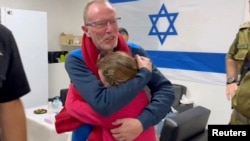A temporary truce between Israel and Hamas reached its sixth day Wednesday, with the two sides expected to release more hostages and prisoners while negotiators pushed for extending the deal.
"We'd like to see the pause extended because what it has enabled, first and foremost, is hostages being released, coming home, being reunited with their families," U.S. Secretary of State Antony Blinken said Wednesday. "It's also enabled us to surge humanitarian assistance to the people of Gaza who so desperately need it."
Blinken is set to travel to the region to meet with Israeli and Palestinian officials for talks about Israel's military campaign, protecting civilian lives in Gaza and working to accelerate deliveries of humanitarian aid.
The original deal called for four days of Israel pausing its campaign to eradicate the Hamas militant group, with Hamas releasing 50 hostages it seized during an attack on Israel last month and Israel setting free 150 Palestinian prisoners. The pause also allowed for increased humanitarian aid to reach the battered Gaza Strip.
A two-day extension was added under the terms of Hamas releasing 10 more hostages per day and Israel freeing additional prisoners.
The Israeli military said 12 hostages who were held in Gaza — 10 Israelis and two foreign nationals — were driven to Israel late Tuesday in the latest round of releases. In turn, Israel freed 30 Palestinian prisoners — 15 women and 15 young men from a West Bank prison and a Jerusalem detention center, according to the Palestinian Prisoners Club, a semi-official organization.
Hamas militants seized about 240 people during their rampage into southern Israel on October 7 in which they killed about 1,200 people. In its counteroffensive, Israel has killed more than 15,000 people, according to the Hamas-controlled Gaza Health Ministry.
The truce has brought Gaza its first quiet after six weeks of intensive Israeli aerial bombardment and a ground offensive prompted by the Hamas attack.
With the Israeli bombardment of the Gaza Strip, the United Nations estimates 1.8 million of Gaza’s 2.3 million people have fled their homes with many staying in overcrowded shelters. Shelter Network, a U.N.-led aid consortium, said in a report Friday that more than 60% of Gaza’s housing stock had been damaged or destroyed.
The World Health Organization warned Tuesday about the high risk of "explosive outbreaks of infectious diseases" amid the overcrowded conditions and the disruption of health, water and sanitation systems in Gaza.
The U.N. Security Council was due to hold a meeting Wednesday focused on the Israel-Hamas conflict.
VOA State Department bureau chief Nike Ching and White House correspondent Anita Powell contributed to this article. Some information for this story came from The Associated Press, Agence France-Presse and Reuters.





Forum